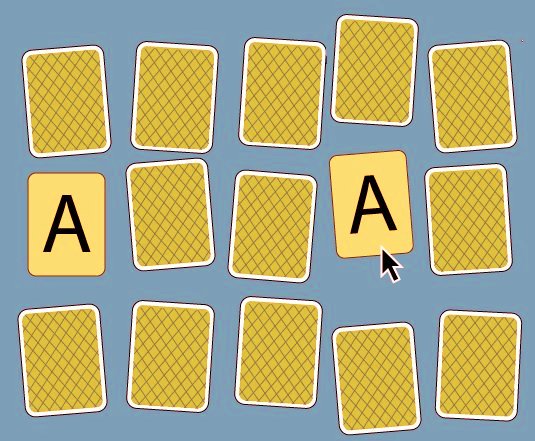IOI '10 P5 - Memory
View as PDF
A game called Memory is played using cards. Each card has one of the letters from
A to Y (ASCII 65 to 89) printed on the face, so that each letter appears on exactly two cards. The cards are shuffled into some random order and dealt face down on the table.
Jack plays the game by turning two cards face up so the letters are visible. For each of the letters Jack gets a candy from his mother the first time he sees both copies of the letter on the two face up cards. For example, the first time Jack turns over both cards that contain the letter
M, he gets a candy. Regardless of whether the letters were equal or not, Jack then turns both cards face down again. The process is repeated until Jack receives candies — one for each letter.
You are to implement a procedure play that plays the game. Your implementation should call the procedure faceup(C) which is implemented by the grader. is a number between
and
denoting a particular card you wish to be turned face up. The card must not currently be face up. faceup(C) returns the character that is printed on the card
.
After every second call to faceup, the grader automatically turns both cards face down again.
Your procedure play may only terminate once Jack has received all candies. It is allowed to make calls to faceup(C) even after the moment when Jack gets the last candy.
Example
The following is one possible sequence of calls your procedure play could make, with explanations.
| Call | Returned value | Explanation |
|---|---|---|
| faceup( | B | Card |
| faceup( | X | Card |
| The grader automatically turns cards 1 and 7 face down. | ||
| faceup( | X | Card |
| faceup( | O | Card |
| The grader automatically turns cards 7 and 15 face down. | ||
| faceup( | X | Card |
| faceup( | X | Card |
| The grader automatically turns cards 50 and 7 face down. | ||
| faceup( | X | Card |
| faceup( | X | Card |
| The grader automatically turns cards 7 and 50 face down. | ||
| faceup( | B | Card |
| ... | ||
| (some function calls were omitted) | ||
| ... | ||
| faceup( | B | Card |
| faceup( | B | Card |
Subtask 1 [50 points]
Implement any strategy that obeys the rules of the game and finishes it within the time limit.
For example, there is a simple strategy that always makes exactly calls to faceup(C).
Subtask 2 [50 points]
Implement a strategy that finishes any possible game with at most calls to faceup(C).
Implementation Details
- Implementation folder:
/home/ioi2010-contestant/memory/(prototype: memory.zip) - To be implemented by contestant:
memory.cormemory.cppormemory.pas - Contestant interface:
memory.hormemory.pas - Grader interface:
grader.horgraderlib.pas - Sample grader:
grader.corgrader.cpporgrader.pasandgraderlib.pas - Sample grader input:
grader.in.1.
Note: the input file contains one line withcharacters denoting the letters on the cards, in order, from
to
.
- Expected output for sample grader input: if your implementation is correct, the output file will contain
OK nwhereis the number of calls to faceup(C).
Comments